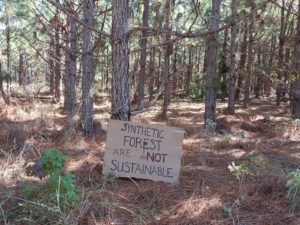The Big Green Lies – FrankenTrees a Clear and Present Danger to the Southeast
Southeast is Ground Zero for Destructive False Forests
ArborGen, a leading biotech corporation specializing in supplying hybrid tree seedlings for the commercial forestry industry is ready to offer a genetically engineered freeze tolerant eucalyptus tree to their customers in the U.S. Southeast.
If the permit to deregulate is granted, this will be the first GE tree specifically designed for commercial applications that will thrive in regions not normally conducive to growing eucalyptus.
This human, desires-driven manipulation of nature is not only to meet current market demands for lumber and wood pulp products but to expand and become a major resource for biomass energy generation. Other end uses include trees that produce chemical elements for synthetic food additives, health and beauty aids, and feedstocks for the production of chemical fertilizers, plastics, paints and even antacids.
ArborGen’s freeze tolerant GE eucalyptus can, if this permit is granted begin distribution before fall planting in states from Texas to South Carolina. If this happens, fields and forests across the southeast could be transformed into massive, toxic, GE eucalyptus plantations.
Highly managed tree plantations, sometimes called “fast forests” in Asia and South America, have caused the demise of millions of acres of fertile rainforest and grasslands. Indigenous Peoples in these regions have lost all rights to their ancestral lands, sometimes by violent and deadly evictions and relocations. Across the world, Indigenous Peoples are being sacrificed for the capitalistic goals of developed countries. There is no reason not to surmise that expansion here in the U.S. will be less intensive or intrusive.
If approved, GE eucalyptus will substitute and supplement coal in power plants across the U.S. The proponents of biomass energy production claim that burning trees is carbon neutral, sustainable, and a cleaner alternative. The U.S. government has also supported this claim and was cited in the now canceled Clean Power Plan, that growing and burning trees for energy is carbon neutral and less polluting. None of which is true.
Not only is burning trees for energy production not carbon neutral nor clean, the unregulated production of these trees will endanger the biodiversity of our natural forests as water resources are depleted and poisoned. Neighboring communities will also be exposed to large quantities of toxic chemicals used for intensive tree production.
Tree plantations if allowed to grow unchecked and become a prime feedstock will encourage unsustainable economic growth at the peril of the precious forests that remain and the delicate biodiversity we can’t afford to sacrifice. Our remaining natural forests could also be in danger of being replaced by GE tree plantations when demands increase for wood fibers and pulp.
Much of the loss is undeniably attributed to an out-of-control system built on the premise that the commodification of the world’s natural resources is somehow sustainable. Every intact forested area on Mother Earth is at risk of focused and rapid exploitation from these industries and the demand for biomass resources will exponentially increase the already severe consequences.
As corporations appropriate more acreage to increase output and profits, we cannot allow this to happen in the southeastern United States.
What’s At Stake
Southeastern Native American and front line rural communities depend on the forests, rivers, swamps and grasslands for cultural resources, and subsistence needs of food and medicine. Encroachment of massive GE tree plantations will have untold negative effects to the surrounding ecosystems. Water tables will be depleted, as eucalyptus requires and aggressively consumes massive amounts of water.
In the last couple of decades, climate change has resulted in diminishing rainfall totals and created severe drought conditions that some areas have not fully recovered from. Adding massive numbers of water-hungry trees will further stress this limited resource, threatening the survival of native species.
Wildfires in the last decade have consumed millions of acres of wildlands and forests. Many of these have been more destructive than fires in the past. Drought and disease has changed the makeup of the forest floor and the natural ability of native trees to withstand and recover from fires. Adding highly flammable eucalyptus trees to southeastern regions will only serve to increase the intensity and destruction. Nearby towns and homes would be at greater risk as well.
Preparation of land for tree plantations will displace and/or eliminate hundreds of birds, animals, fish, insects, and fauna as thousands of acres are cleared of all vegetation. Nothing can remain but bare earth. Next herbicides are sprayed profusely over the entire area to prevent any leftover or new vegetation from competing with the newly planted seedlings. Fertilizer and pesticides are applied by plane or large sprinkler-type mechanisms on a regular basis, allowing deadly chemical drift far beyond the borders of the tree plantation. Rains and runoff will carry chemicals down into the water table and nearby streams and rivers. The natural process of convection has also been proven to spread these substances hundreds if not thousands of miles away.
Commercial GE eucalyptus tree plantations will operate on a five- to seven-year planting/harvesting cycles. After each harvest the cycle of clearing and application of chemicals begins again. The land suffers repeated intense removal of organic matter, and continued applications of chemical fertilizer, pesticides, and herbicides.
High concentrations of GE eucalyptus tree plantations will have unpredictable and irreversible negative consequences to our diverse and complex ecosystems.
We can’t afford to continue to saturate our air, water, and lands with high concentrations of deadly chemicals and expect that our lives and those of future generations won’t be at risk. We can’t continue to extract resources from Mother Earth at the speed and quantities we are currently taking them and expect to survive as a species.
Eucalyptus is listed as a highly invasive species and is not native to North America. Like other genetically modified organisms (GMOs), these GE trees carry with them the risk of invading delicate ecosystems. The assurances provided that these won’t escape into the wild aren’t backed up by historical evidence. During the U.S.’s 30-year experiment with GE crops there is case after case of them escaping containment, despite industry and USDA’s claims that they would not. Once released the feral characteristics that enable them to thrive in the wild, will pose grave and devastating risks to our natural forests.
Genetic engineering also comes with the risk of mutations to both the GE organism and others within the ecosystem it is placed. Stresses like disease, drought, and changes in tolerances toward chemicals used can produce unwanted and destructive consequences. To engineer this GE “freeze tolerant” eucalyptus, ArborGen used gene sequences from 6 different species of bacteria and plants, which provides additional threats of mutations in the tree’s genome when it is exposed to environmental stresses like drought, disease, and chemical exposures.
Precautionary Principle Must Be Implemented
There are far too many unanswered questions regarding potential risks associated with releasing millions of GE eucalyptus trees across the U.S. Southeast. These questions alone precipitate a complete moratorium on approval of all genetically engineered trees and suspending all field trials until answers can be provided. Native American Tribes and front line communities must be consulted before GE tree plantations are established within their regions and requirements must be established and enforced to ensure protection from aggressive expansion tactics that have caused major human rights violations in developing countries.
USDA’s Sonny Perdue likely to support bioengineering of our forests!
DEADLY / DESTRUCTIVE Wildfires in Chile & Portugal made Worse by Eucalyptus Plantations
Statement from Biofuelwatch, Global Justice Ecology Project and Indigenous Environmental Network
New York (US)–New Zealand-owned tree biotechnology company ArborGen faces near unanimous opposition to commercial deregulation of their genetically engineered eucalyptus trees. On 5 July, the US Department of Agriculture received an astounding 280,000 individual comments, as well as 500 organizations representing millions of people around the world, all opposing this deregulation. Only 3 comments were submitted in favor. This avalanche of comments came a mere 75 days after the USDA publicly released their draft Environmental Impact Statement on ArborGen’s request for deregulation.
Such overwhelming opposition sends a clear message to USDA that GE eucalyptus trees must be rejected–a message the agency can no longer ignore.
ArborGen’s eucalyptus are engineered for cold tolerance with the intent of extending their range into the Southern US, from South Carolina to Texas. Eucalyptus trees are native only to Australia. Eucalyptus plantations are invasive, notorious for depleting waterways and highly flammable–as demonstrated by recent wildfires in Chile and Portugal. Their introduction to Southern US states, where droughts, heatwaves and wildfires are already escalating, would be foolhardy.
ArborGen claims their GE eucalyptus will meet expanding market demands for pulp and paper, as well as the fast-growing demand for wood pellets for “biomass.” Currently, EU greenhouse gas emission policies provide subsidies to burn wood as an alternative to fossil fuels, in spite of the fact that doing so results in deforestation and releases even more CO2. These demands will not be met, however, without the accelerated destruction of native forests, including for GE eucalyptus plantation development–both in the US and globally.
Industrial plantations of eucalyptus are already creating problems in many parts of the world, and the US should learn from those experiences. In Brazil, they are referred to as “green deserts.” Similarly, experience with GE crops has demonstrated that engineering fails to deliver on promises, while introducing new problems (i.e. contamination, vastly increased use of toxic agrochemicals and herbicide resistant weeds). Common sense dictates that regenerating native forests and reducing demands for wood are essential to addressing the climate and biodiversity crises. Expanding plantations of non-native, water depleting, flammable GE eucalyptus, on the other hand, is beyond irresponsible.
With near unanimous opposition to ArborGen’s GE eucalyptus trees, people have sent a clear message to the USDA: Commercial release of GE eucalyptus trees will not be tolerated.
On 29 June, less than one week before the end of the USDA public comment period on ArborGen’s GE eucalyptus, ArborGen’s two U.S.-based owners and co-founders, International Paper and WestRock (formerly MeadWestvaco) sold their interest in ArborGen to New Zealand-based Rubicon, which is now the sole owner.The following numbers of comments rejecting GE eucalyptus trees were submitted to the USDA on 5 July 2017 by these organizations:
Center for Food Safety 24,885
Global Justice Ecology Project 12,312
Friends of the Earth US 27,638
Credo 100,497
Rainforest Rescue 113,236
Center for Biological Diversity 3,107
Action Aid US 1,065
Indigenous Environmental Netwk 985
Total 283,725
IEN is a member organization of the Campaign to Stop GE Trees.


